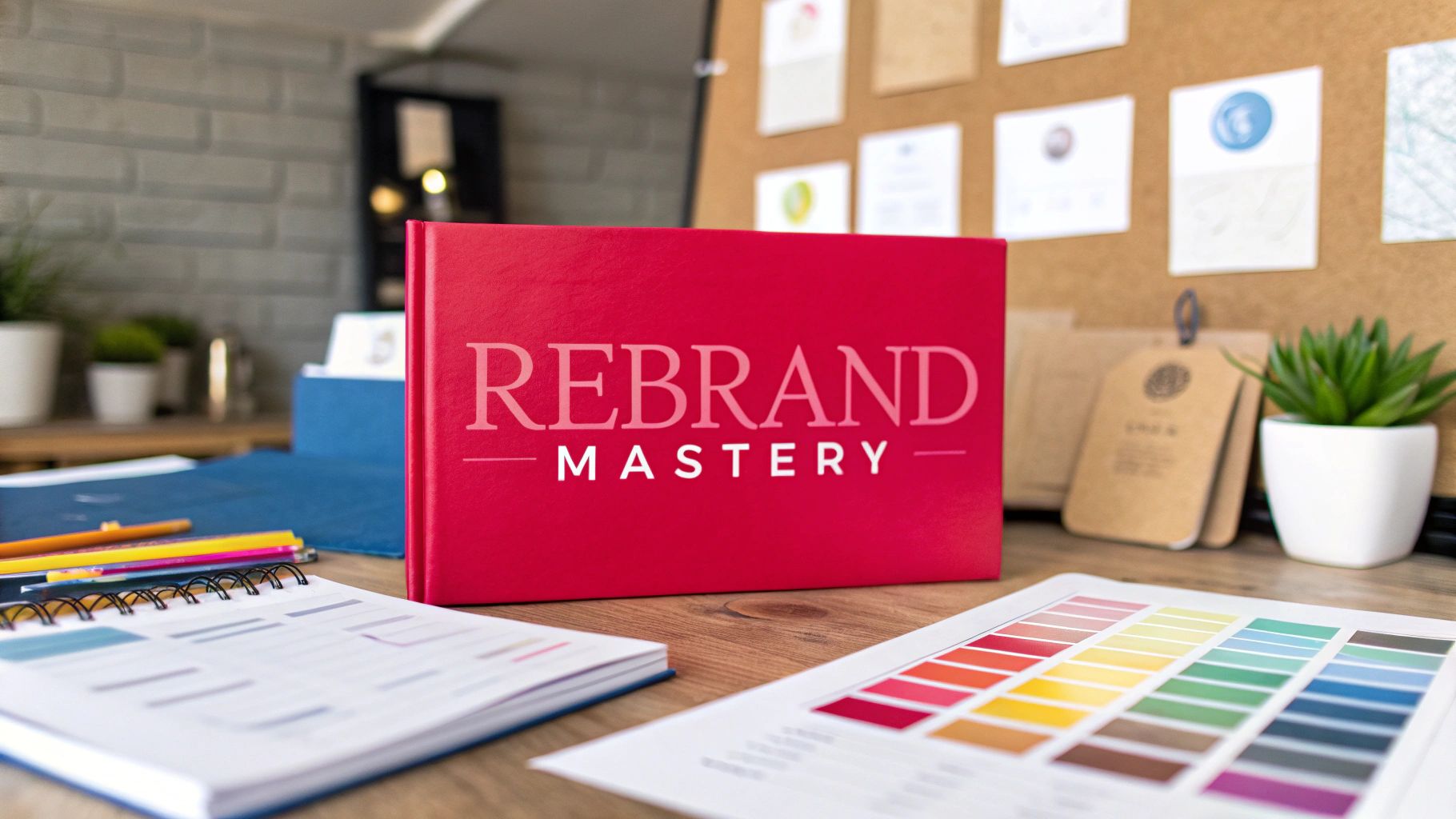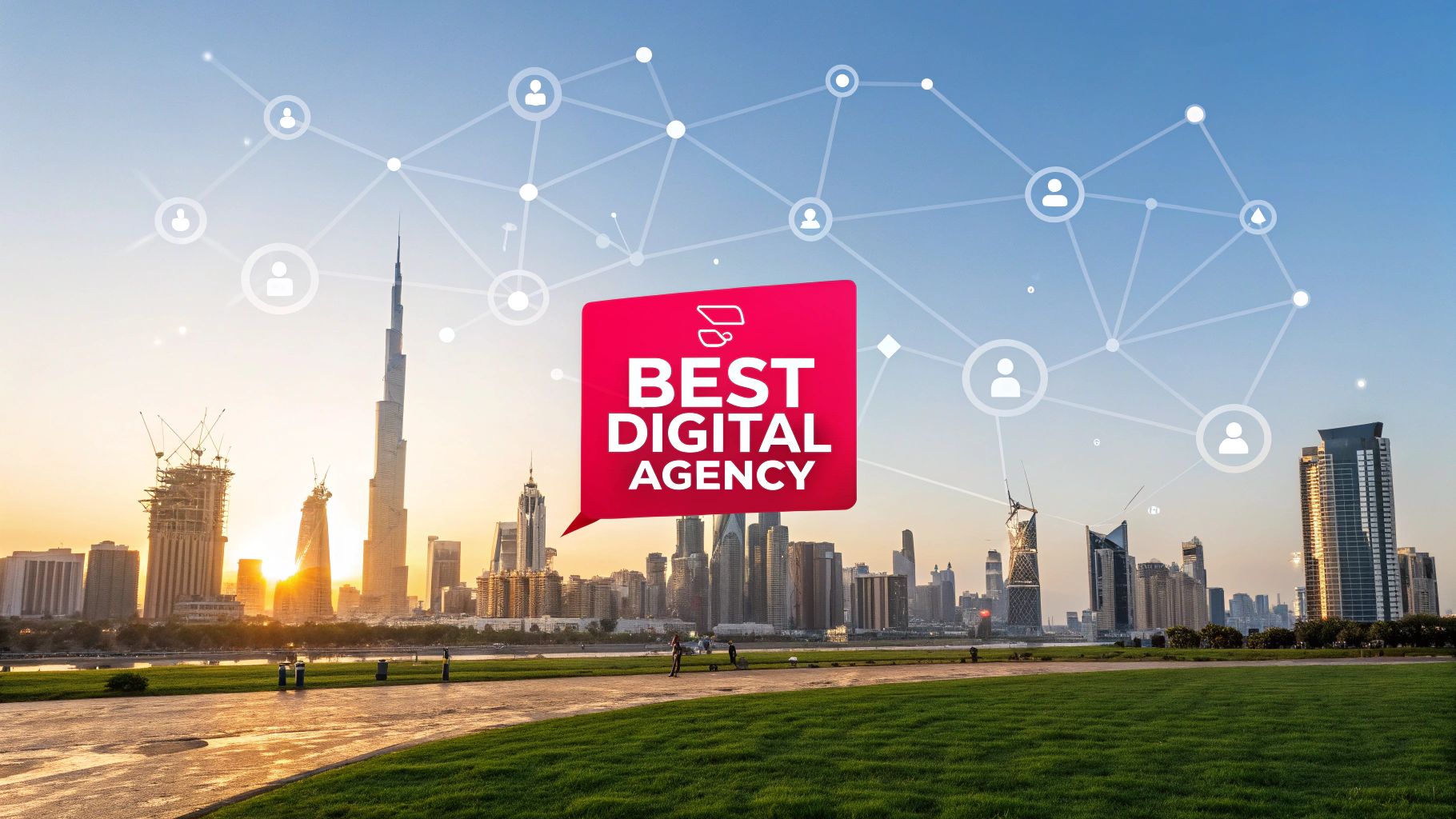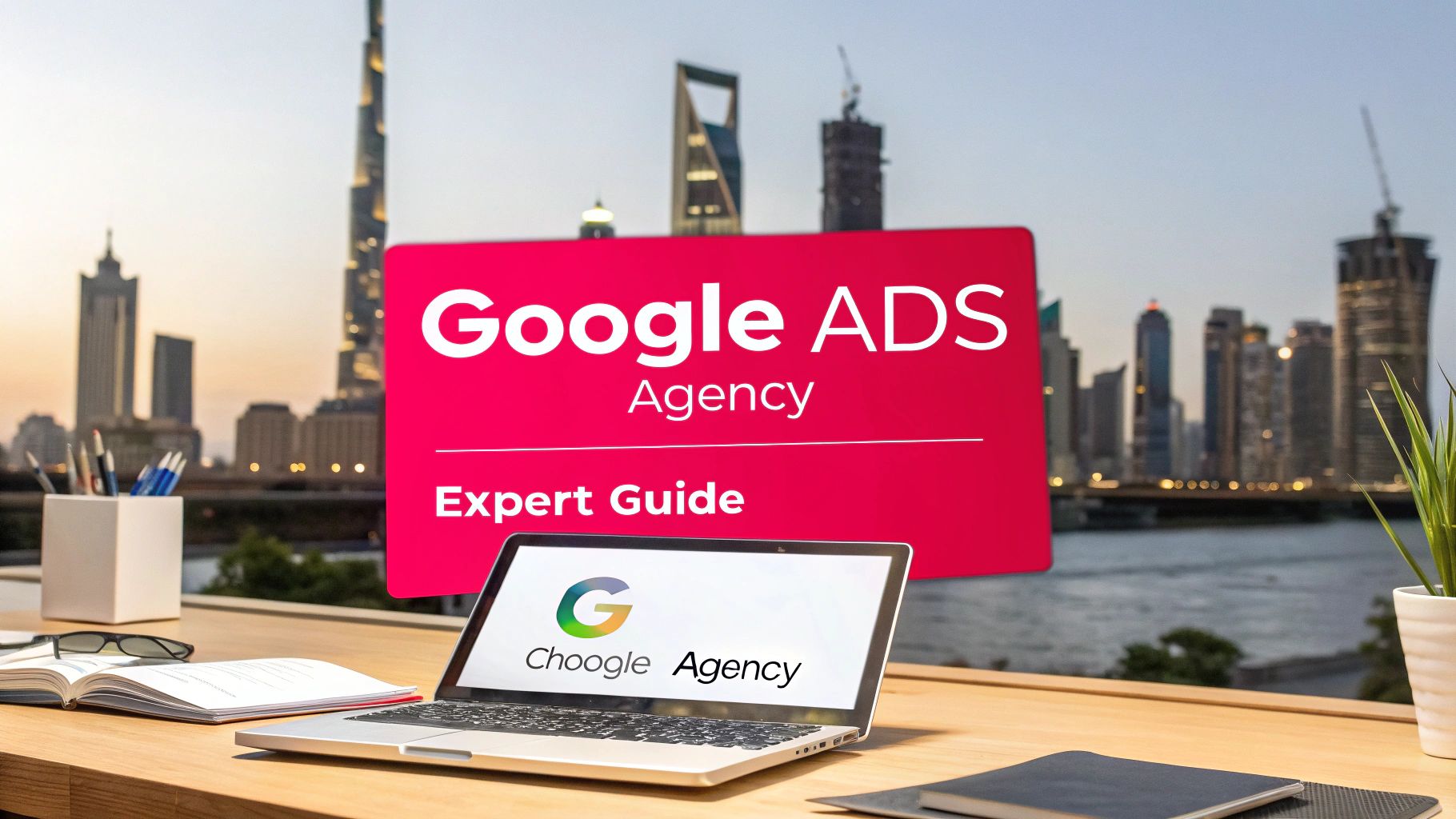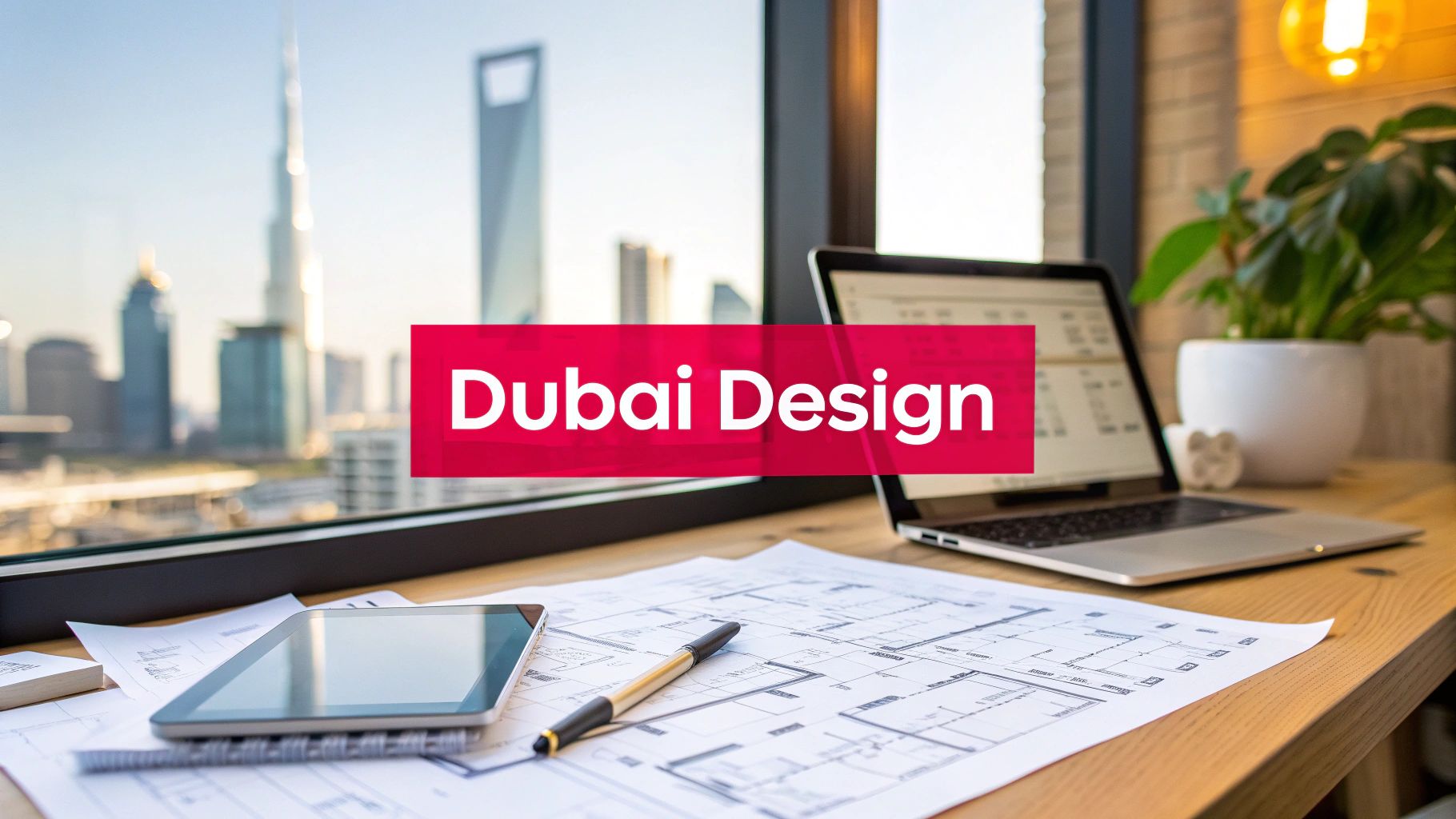Finding the right e-commerce development company in Dubai is about more than just hiring coders. It's about finding a genuine partner who gets the pulse of this unique, lightning-fast market. The best agencies here don't just build websites; they build sales machines, blending technical expertise with a real-world understanding of local shoppers, payment systems, and delivery logistics.
Why Dubai's E-commerce Market Is a Global Powerhouse
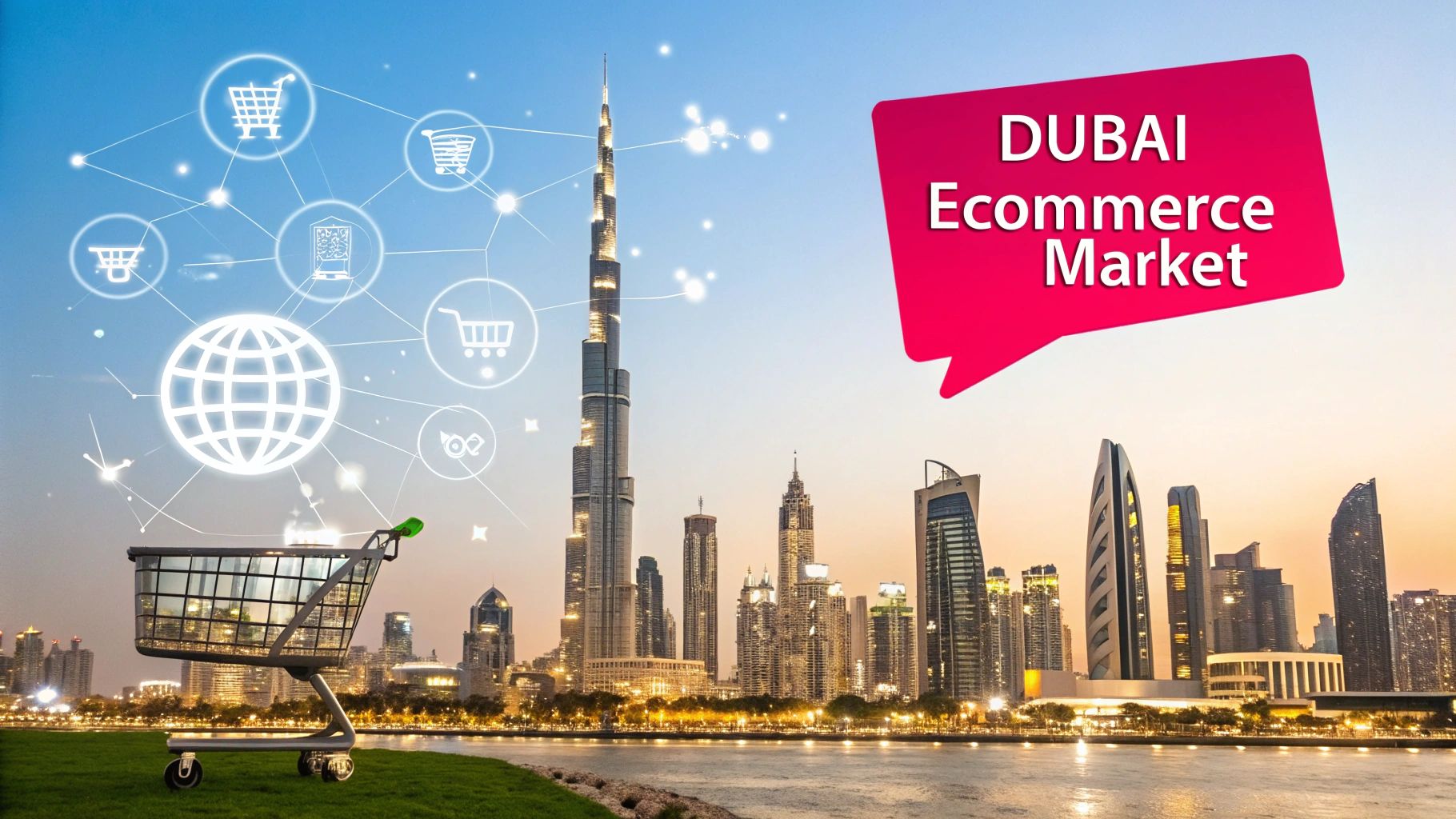
Before you start vetting potential developers, you need to appreciate the ground you're building on. Dubai isn't just another city with online stores; it’s a globally connected hub where digital retail is absolutely exploding. This environment offers huge rewards but also comes with its own set of rules and challenges.
The growth numbers alone are almost hard to believe. As the epicentre of the UAE's e-commerce scene, Dubai is at the heart of a market that hit USD 125.0 billion in 2024. But here's the kicker: it's projected to soar to a massive USD 776.2 billion by 2033. That’s a compound annual growth rate (CAGR) of 21.4%. This isn't just steady growth; it's a gold rush, and it's fuelled by a unique combination of factors.
The Pillars of Dubai's Digital Dominance
So, what’s driving this incredible momentum? It really boils down to a few key advantages. First, the digital infrastructure here is world-class. The UAE has phenomenal high-speed internet coverage and one of the highest smartphone penetration rates on the planet. Your customers are already online, they’re mobile-first, and they’re completely comfortable buying things on their devices.
Then there's the government's role. Proactive initiatives like Dubai’s Smart City project have been instrumental. They've fostered a business-friendly climate that not only encourages but rewards digital innovation, weaving technology into the fabric of everyday life.
Success in Dubai's e-commerce sector requires more than a functional website. It demands a deep appreciation for local consumer expectations, from multilingual support in Arabic and English to offering preferred payment methods like cash on delivery alongside digital wallets.
Understanding the Local Consumer and Logistics
The customer base in Dubai is a melting pot of local Emiratis, a huge expatriate community from every corner of the globe, and a constant flow of tourists. This diverse audience has sophisticated tastes and high expectations. To win them over, your online store absolutely must nail the local details.
Here's what that looks like in practice:
- Multilingual Functionality: Your site needs to be flawless in both Arabic and English. This isn't a "nice-to-have"; it's a non-negotiable for reaching the entire market.
- Localised Payment Options: You have to integrate with regional payment gateways like PayFort or Telr. Offering these alongside the big international names builds immense trust and directly boosts your conversion rates.
- Efficient Logistics: Shoppers here expect their orders, and they expect them fast. Dubai's logistics network is fantastic, but your development partner needs hands-on experience integrating with local couriers like Aramex to make it work seamlessly.
Grasping these nuances shifts your mindset. You're no longer just looking for a web developer; you're hunting for a strategic partner. Your goal is to find an e-commerce development company in Dubai with a track record of navigating this specific ecosystem. For a closer look at the market dynamics, our guide on succeeding with e-commerce in Dubai offers some great insights. Arming yourself with this knowledge is the best way to ask the right questions and choose a partner who can truly help you grow.
Defining Your E-commerce Project Blueprint

Walking into a meeting with an e-commerce development company in Dubai without a clear plan is a recipe for disaster. It’s like trying to build a house without a blueprint—you’ll waste time, blow your budget, and end up with something that doesn’t work.
A detailed project brief is your roadmap. It forces you to think through the tough questions upfront and get your own vision straight. More importantly, it gives potential agencies the clarity they need to provide a sharp, accurate proposal instead of a vague guess. Without it, you’re setting yourself up for misunderstood requirements and spiralling costs.
Know Your Customer Inside Out
Before you even think about code, you need an almost uncomfortably detailed picture of your ideal customer. This is more than just age and gender. In a place as diverse as Dubai, digging into cultural nuances and local buying habits is the difference between success and failure.
Who are you actually selling to? Is it an Emirati national who expects an Arabic-first experience and cash on delivery? Or a British expat who wants to pay with a credit card and expects next-day delivery? Defining these customer personas is critical, as they’ll dictate everything from your site’s layout and language to the payment options you absolutely must have.
To get this right, ask yourself:
- Primary Language: Is a flawless Arabic and English bilingual experience a must-have?
- Payment Preferences: Will you need local buy-now-pay-later options like Tabby, or are international gateways like Stripe enough?
- Device Usage: Are your customers scrolling on their phones during a metro ride or browsing on a desktop at home?
- Buying Triggers: What makes them click "buy"? Is it the prestige of the brand, a great deal, or the promise of super-fast delivery?
Answering these questions removes the guesswork and ensures the final product actually connects with the people you need to reach.
Mapping Out Essential Features and Functionality
Once you know who you're building for, you can map out the non-negotiable features your site needs to function. Think of this as the engine and chassis of your car—the core components that make it go.
It’s easy to get sidetracked by flashy, nice-to-have features while completely missing the basics. For any e-commerce business in the UAE, some things just aren't optional.
A project brief that clearly specifies localisation needs—like multi-currency (AED/USD), right-to-left (RTL) layout for Arabic, and integration with local couriers—instantly shows a development firm that you're a serious client who understands the market.
Your blueprint also needs to consider things like the technical setup of your Google Shopping Feed to make sure your products show up in searches from day one. A smart move is to split your feature list into two camps: "must-haves" for launch and "nice-to-haves" for phase two. This kind of prioritisation is your best tool for keeping the project on budget and on schedule.
| Feature Category | Examples for the Dubai Market | Why It Matters |
|---|---|---|
| Localisation | Arabic/English toggle, AED currency, RTL text support | You need to serve the entire resident and tourist population, not just a fraction of it. |
| Payments | Integration with Telr, PayFort, Tabby, Cash on Delivery | Offering familiar, trusted payment options is key to reducing abandoned baskets. |
| Logistics | Aramex, SMSA Express, or local courier API integration | Fast, reliable delivery is a massive expectation. Accurate shipping rates are a must. |
| Compliance | Adherence to TDRA guidelines, clear privacy policy | This is crucial for operating legally and building the trust of your customers. |
Setting a Realistic Budget and Timeline
Finally, your blueprint needs to get real about money and time. Be honest with yourself about what you can afford. A professional e-commerce site is a major investment, and giving agencies a clear budget range helps them propose a solution that actually fits your financial reality.
It’s also fine to have a target launch date, but try to stay a bit flexible. Unexpected things always come up in development. A good partner will be upfront about what’s possible in your timeframe. Laying these cards on the table from the very beginning ensures any proposal you get is grounded in reality, paving the way for a partnership that works.
How to Research and Shortlist Potential Partners
Okay, you’ve got your project plan sorted. Now for the exciting part: finding the right team to make it all happen. The goal here isn’t just to hire a developer; it’s to find a genuine partner. This means digging deeper than a simple Google search to find an ecommerce development company in Dubai that truly gets your vision.
The initial search can feel like a lot, I know. But if you approach it systematically, you can go from a long list of possibilities to a handful of real contenders pretty quickly. It's all about looking for tangible proof of their expertise.
Going Beyond the First Page of Google
Search engines are a fine place to start, but the real gems are often found elsewhere. Your professional network is a goldmine. Jump on LinkedIn and see which agencies people in your industry are connected with or recommending. A personal recommendation often carries more weight than a paid ad.
Also, check out industry-specific directories. Platforms like Clutch and GoodFirms are fantastic because they offer verified reviews from actual clients. You get a much more honest picture of an agency's strengths and weaknesses than you would from their own marketing copy.
One of my biggest pieces of advice is this: when you look at a portfolio, don't just look at the pretty designs. Look for strategy. Are there examples of successful e-commerce sites they've built for businesses in the MENA region with challenges similar to yours? That’s what matters.
Scrutinising Portfolios and Case Studies
An agency's past work is the best predictor of its future performance. Don't just skim the screenshots in their portfolio—go to the live websites they've built and put them through their paces.
As you click around, ask yourself a few critical questions:
- Is it easy to use? Can I find what I’m looking for and check out without any friction? A confusing user experience is a massive red flag.
- Is it fast? Nobody waits for a slow site. Use a tool like Google PageSpeed Insights to test the performance of their previous projects. If they’re sluggish, walk away.
- Is it properly localised? This is crucial in Dubai. Do their sites have a flawless right-to-left (RTL) Arabic version? Do they integrate with local payment gateways and regional shipping companies? This shows they actually understand the market.
Case studies tell the story behind the project. A good one won’t just show you the finished product; it will walk you through the client's problem, the agency's solution, and—most importantly—the results. Look for hard numbers: increased conversion rates, higher average order values, or a drop in abandoned baskets.
This infographic gives you a snapshot of the performance and security benchmarks that top-tier development agencies are always focused on.
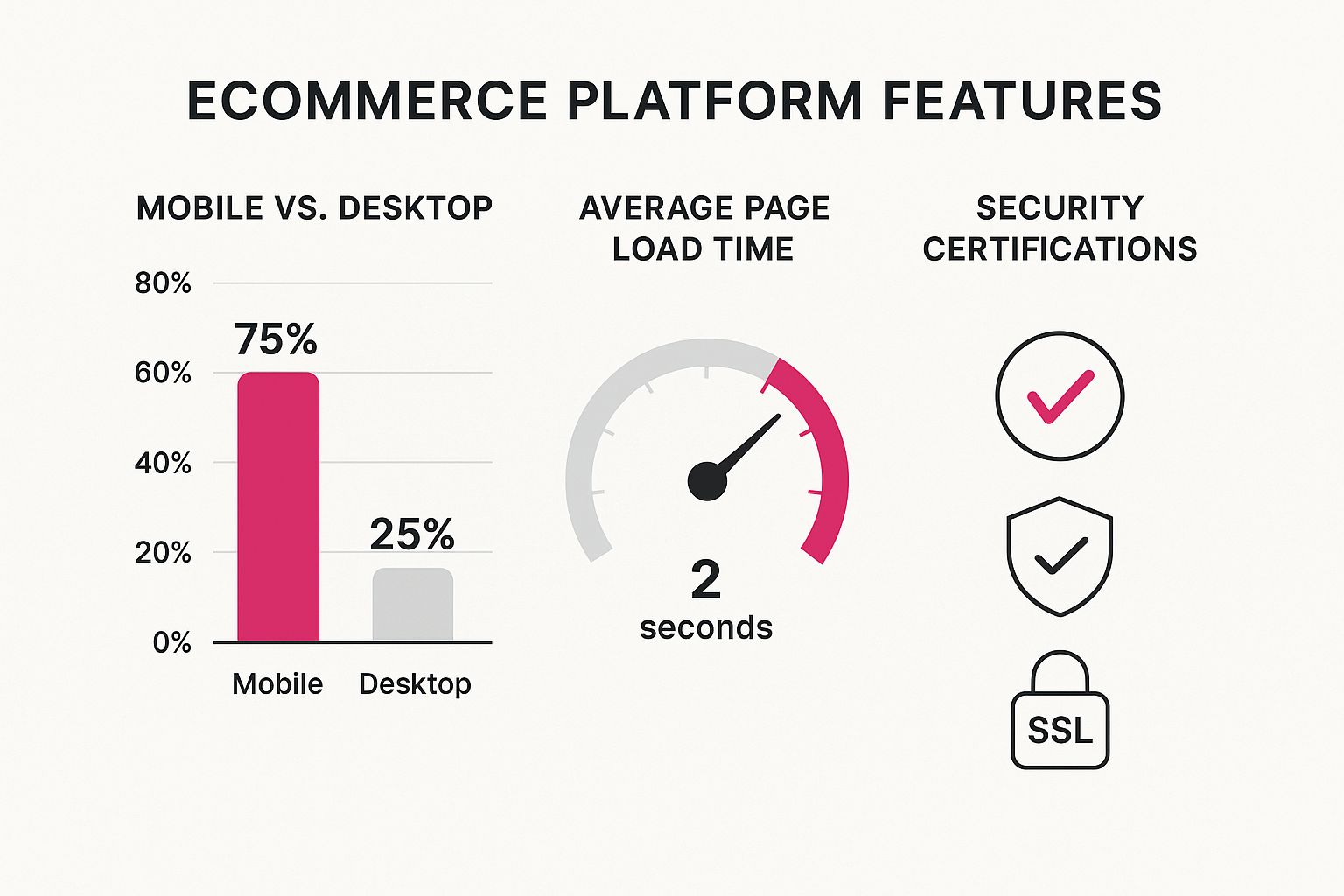
The stats don't lie. Mobile commerce is king, page load speed is non-negotiable, and recognised security seals are essential for building trust with your customers from day one.
Matching Technology Stacks to Your Goals
The technology an agency works with is a big deal. Different platforms are built for different kinds of businesses. For example, an agency that lives and breathes Shopify is perfect for startups and brands that need to get to market quickly with a scalable, easy-to-manage store. On the other hand, an agency specialising in Magento (now Adobe Commerce) is a better fit for a large enterprise with complex B2B needs and a demand for deep customisation.
Choosing the right platform is a major decision, so it's helpful to see how the main contenders stack up, especially for the Dubai market.
Ecommerce Platform Feature Comparison
| Platform | Best For | Localisation Features | Scalability | Typical Cost |
|---|---|---|---|---|
| Shopify | Startups, SMEs, and direct-to-consumer (DTC) brands. | Good multi-language/currency apps, but RTL may need custom work. | Excellent, from basic to Plus plans. | Monthly subscription + transaction fees. |
| Magento | Large enterprises, B2B, and businesses with complex catalogues. | Strong native support for multiple languages and currencies. | Highly scalable but requires significant dev resources. | High, often requires dedicated hosting and developers. |
| WooCommerce | Businesses already on WordPress, budget-conscious startups. | Highly customisable via plugins for local payment/shipping. | Good, but performance depends heavily on hosting. | Low initial cost (open-source), but plugin/dev costs add up. |
| BigCommerce | Mid-market businesses looking for a balance of features and ease of use. | Solid out-of-the-box multi-currency and language features. | Very strong, SaaS model handles growth well. | Monthly subscription, often with no transaction fees. |
Ultimately, don't get hung up on a specific technology before you've even spoken to an expert. A great agency will listen to your business goals and then recommend the platform that serves those goals best, not just the one they prefer to use.
For a deeper dive, you can explore some of the top e-commerce companies in Dubai to see their specialities and how they align with your long-term plans. This kind of homework helps you create a shortlist of agencies whose technical skills are a perfect match for what you want to achieve.
Asking the Right Questions During Consultations
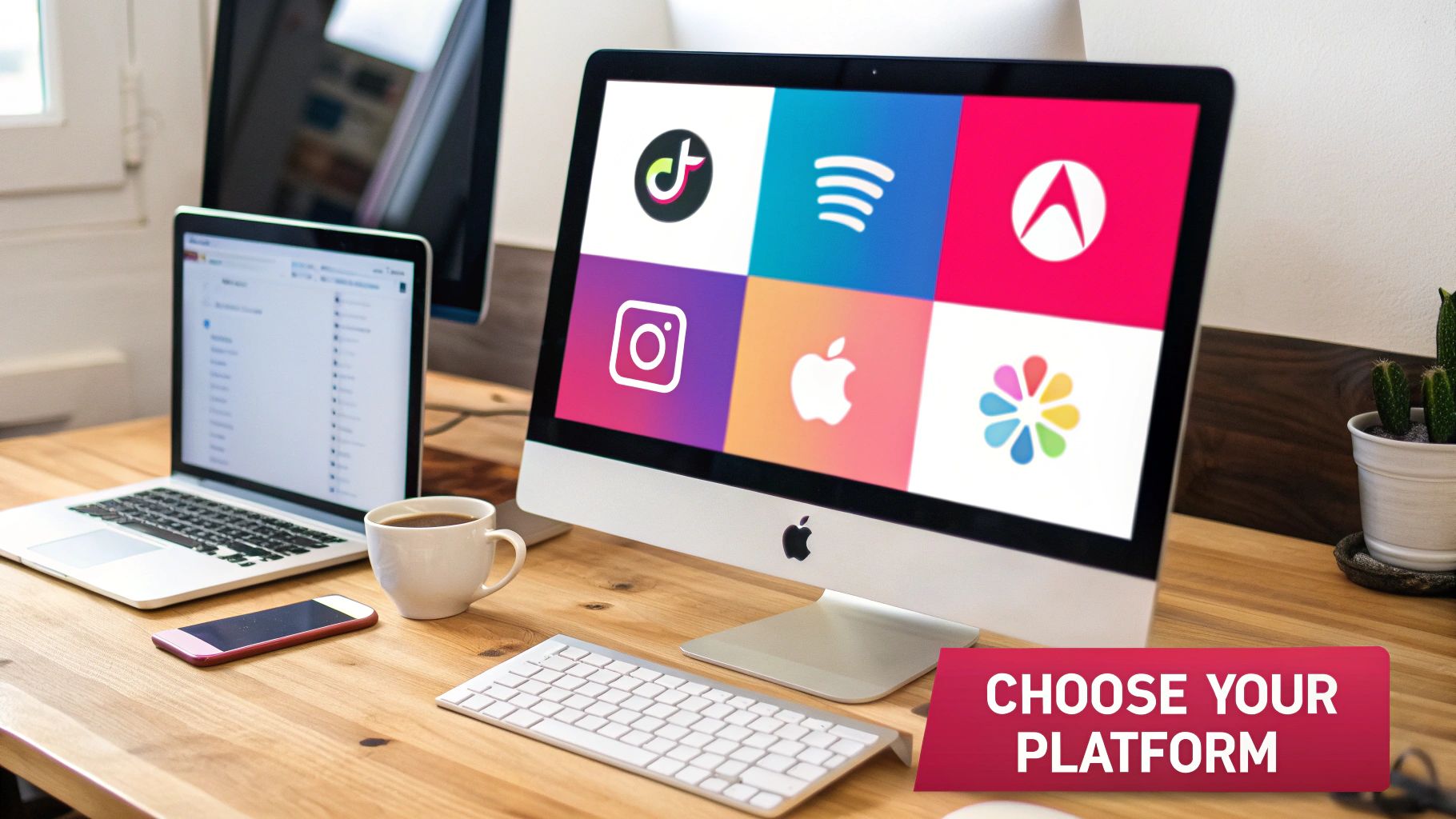
Alright, you've done the legwork and have a shortlist of agencies that look promising on paper. Now comes the most crucial part: the initial consultations. This is your chance to look past the slick portfolios and see how they really operate.
It’s easy to get fixated on the price tag, but trust me, that’s a rookie mistake. A lower upfront cost can often mean bigger headaches later on. Your real mission here is to dig into their process, their communication style, and, most importantly, their genuine grasp of the Dubai market. Their answers will tell you if they're just another vendor or a true partner who's invested in seeing you succeed.
How Do They Actually Build Things?
Every agency has its own way of working, and their methodology can make or break your project's timeline and budget. The two big ones you'll hear about are Agile and Waterfall. You need to know which one they favour and why they think it’s right for you.
- Agile is all about working in short bursts, or "sprints." This approach is fantastic because it allows for feedback and changes along the way. If you think your requirements might shift as the project progresses, Agile is your friend.
- Waterfall is the more traditional, step-by-step method. You finish one phase completely before starting the next. It’s solid, but only if you have every single detail of your project locked down from day one.
Ask them to walk you through a typical project from start to finish. What happens when a client wants to add a new feature halfway through? How do they handle unexpected roadblocks? A seasoned e-commerce development company in Dubai will be able to answer this without skipping a beat, showing they’re adaptable and can think on their feet.
Do They Genuinely Understand the Dubai Market?
This is where you separate the pros from the pretenders. An agency can build beautiful websites all day long, but if they haven’t tackled the unique challenges of e-commerce in Dubai, you’re in for a world of pain.
The local market has its quirks. For instance, Business-to-Consumer (B2C) sales make up a massive 68% of the market, a trend fuelled by high smartphone usage and a love for brand-driven shopping. Local innovations like the UAE Pass digital identity system and the widespread use of mobile wallets like e& money have made the checkout experience incredibly smooth. A good agency knows this stuff inside and out. You can dive deeper into these trends with this excellent report on the UAE e-commerce market.
My advice? Get specific. Don't just ask, "Do you know local payment gateways?" Instead, try: "Tell me about a time you integrated Telr and had to troubleshoot a tricky API problem." The level of detail in their response will tell you everything you need to know.
Get right to the point with your questions:
- Local Payment Gateways: How many sites have you successfully launched with PayFort, Telr, or a "buy now, pay later" service like Tabby?
- Logistics Providers: Can you walk me through an integration you did with Aramex or another regional courier for live shipping rates?
- Local Regulations: How do you ensure the websites you build are compliant with the Telecommunications and Digital Government Regulatory Authority (TDRA)?
If they can answer these confidently and with real examples, you know they've been in the trenches and won't be using your project for on-the-job training.
What Happens After the Launch?
Building the site is only half the battle. You need to know how you'll work together. Who will be your day-to-day contact? What tools do they use to keep you in the loop—Slack, email, a project portal? Will you get weekly updates or be left guessing?
And finally, don't forget to talk about life after go-live. An e-commerce site isn't something you can just set and forget; it needs constant care. What do their support and maintenance packages look like? Do they offer different service levels? What’s their guaranteed response time if your site crashes on a Friday afternoon? A reliable partner will have a clear, structured plan to keep your store running smoothly long after the project is officially "done."
If you’re looking for more general advice on picking a partner, our guide on selecting a website development company offers some great additional insights.
Evaluating Proposals and Understanding Costs
Once the proposals start rolling in, it’s time to put on your detective hat. A good proposal from an e-commerce development company in Dubai is more than just a quote; it’s a roadmap. It should clearly outline their plan to turn your vision into a reality. The trick is to look past the final price tag and really dig into the details.
Your main job here is to make sure you're comparing apples with apples. A surprisingly low quote might be tempting, but it often means they’ve left out crucial things like post-launch support or basic SEO setup. You’ll end up paying for those later, and it’s always more expensive that way. A transparent proposal will break down every single phase—discovery, design, development, testing, and deployment—so you know exactly what you’re paying for.
Deconstructing Common Pricing Models
To make sense of the numbers, you first need to get your head around how agencies structure their fees. In Dubai, you'll typically encounter one of three models, and each has its pros and cons depending on your project.
- Fixed Price: You get a single, all-in cost for the entire project. This is fantastic if your project scope is crystal clear and unlikely to change, as it gives you total budget predictability. The downside? It’s rigid. Any change of plans or new ideas mid-project will almost always come with extra costs.
- Time & Materials (T&M): Here, you pay for the actual hours the team puts in. This model offers incredible flexibility, making it perfect for complex projects where you expect requirements to evolve as you go. The risk, of course, is that the budget can swell if the project's scope isn't managed with a firm hand.
- Retainer: This involves a set monthly fee for an agreed-upon number of hours for development or ongoing support. It’s the ideal setup for long-term partnerships, allowing for continuous improvements and maintenance long after your site is live.
Spotting Red Flags and Hidden Costs
A vague proposal is a massive red flag. If an agency can’t spell out precisely what’s included, it suggests they either haven’t fully grasped your requirements or they're deliberately leaving things fuzzy to add on charges later. To really get a handle on this, you need to understand the various factors influencing the cost of e-commerce website development.
Be especially sceptical of any price that seems too good to be true—because it almost always is. Some firms will lowball their bid just to win your business, then either cut corners on quality or hit you with hefty fees for every tiny tweak.
A professional proposal should clearly state what is not included. This isn't a bad thing; it’s a sign of honesty and solid project management. Look for specifics on things like third-party software licences, content creation, and recurring hosting fees.
Assessing Timelines and Long-Term Value
Finally, take a hard look at the proposed timeline. Does it feel realistic? A schedule that seems too quick might mean the agency is rushing or just slapping a generic template on your project. On the other hand, an excessively long timeline could point to inefficiency. Ask them to walk you through their schedule, phase by phase, and explain their reasoning.
Getting this right is crucial, especially in Dubai's buzzing e-commerce scene. Apparel is the biggest player, making up nearly 18% of all online stores in the UAE. Home & Garden (14.6%) and Beauty & Fitness (11.5%) aren't far behind, with thousands of other businesses joining the fray. With e-commerce sales in the UAE projected to hit $8 billion by 2025, you need a partner who delivers long-term value, not just a cheap launch. Your goal is to carve out a sustainable space in this booming market.
A Few Common Questions, Answered
Choosing the right e-commerce partner in Dubai naturally comes with a lot of questions. Let's tackle some of the most common ones I hear from business owners, helping you move forward with confidence.
What’s the Real Cost of Building an E-commerce Site in Dubai?
The investment needed to build an online store in Dubai can swing wildly depending on what you’re trying to achieve. If you're starting out, a clean, professional Shopify site might set you back around AED 15,000. It's a fantastic way to get your products online quickly.
On the other end of the spectrum, if you're looking for a bespoke platform with deep integrations built on a powerful framework like Magento, the cost can climb anywhere from AED 100,000 to well over AED 500,000.
What drives that number up? Things like custom feature development, linking up with your existing ERP or CRM systems, and unique, ground-up design work. Before you sign anything, make sure you get a detailed breakdown of costs. You need to know exactly where every dirham is going.
Should I Pick a Specialist E-commerce Agency or a General Web Developer?
For any serious e-commerce project in Dubai, my advice is always to go with a specialist agency. It's a night-and-day difference.
Sure, a generalist web developer can build you a website that works. But an e-commerce specialist builds you a business that sells.
An experienced e-commerce agency brings deep knowledge of what actually makes people click "buy." They understand conversion rate optimisation (CRO), the specifics of integrating local payment gateways and shipping partners, and the unique shopping habits of consumers in the UAE. That's the expertise that turns a website into a sales machine.
How Critical Is Ongoing Support After Launch?
Think of it this way: your e-commerce site is a high-performance car, not a piece of furniture. You can't just set it up and forget about it. Ongoing support isn't just a "nice-to-have"—it's absolutely essential for long-term success.
Your site needs constant attention to stay secure, fast, and functional. This means regular security patches to fend off threats, performance tweaks to keep it loading quickly, and someone on call to squash bugs the moment they appear.
When vetting any e-commerce development company in Dubai, look very closely at their post-launch support plans and Service Level Agreements (SLAs). If their support plan seems vague or is an afterthought, that’s a major red flag. It tells you they might not be invested in your business's future.
Will They Also Handle Digital Marketing and SEO?
Many of the best e-commerce development companies in Dubai either have an in-house marketing team or work closely with trusted partners. This is a huge plus. Getting an agency that gets SEO from the very start gives you a massive head start.
When your site is built with SEO in mind, its architecture is clean, it's easy for Google to crawl, and you'll find it much easier to rank for your target keywords. It’s worth asking specifically about their skills in the areas that actually drive traffic and revenue:
- SEO: Is the site being built on a search-friendly foundation from day one?
- PPC: Can they run effective ad campaigns on Google, Instagram, or TikTok?
- Social Media Marketing: Do they have a plan to create a community and engage your ideal customers?
When your development and marketing efforts are pulling in the same direction, you get much better results and sustainable growth.
Ready to build an online store that truly connects with customers and drives sales in the Dubai market? At Grassroots Creative Agency, we mix strategic thinking with technical know-how to create powerful e-commerce platforms. Let's build your success story together.
